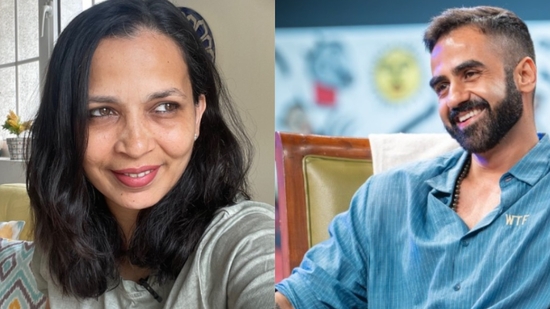In February 2025, a social media exchange between entrepreneur Nikhil Kamath and nutritionist Rujuta Diwekar ignited a widespread debate on the significance of traditional home-cooked meals in modern lifestyles. The discourse delved into themes of privilege, cultural heritage, and the evolving dynamics of food consumption in contemporary society.
The Genesis of the Debate
Nikhil Kamath, co-founder of Zerodha and a prominent figure in India’s financial sector, shared a post on his social media platforms expressing skepticism about the practicality of adhering to traditional dietary practices in today’s fast-paced world. He questioned whether the emphasis on “ghar ka khana” (home-cooked food) was feasible for individuals juggling demanding careers and urban lifestyles.
Kamath’s perspective resonated with many urban professionals who find it challenging to balance work commitments with the time-intensive process of preparing traditional meals. However, his remarks also sparked criticism from those who viewed his stance as dismissive of cultural values and the health benefits associated with home-cooked food.
Rujuta Diwekar’s Response
Renowned nutritionist and author Rujuta Diwekar, known for her advocacy of traditional Indian diets, responded to Kamath’s comments with a pointed critique. In her response, she emphasized that the promotion of home-cooked meals is not a matter of privilege but a fundamental aspect of health and well-being. Diwekar highlighted that traditional diets are deeply rooted in cultural wisdom and are designed to provide balanced nutrition suited to individual needs.
She further argued that the narrative suggesting only the affluent can afford the time and resources for home-cooked meals undermines the experiences of countless families who prioritize cooking at home despite economic constraints. Diwekar’s rebuttal underscored the importance of viewing food not merely as fuel but as an integral component of cultural identity and community.
Public Reactions and Media Coverage
The exchange between Kamath and Diwekar quickly gained traction across social media platforms, leading to a polarized discourse. Supporters of Kamath argued that in the context of globalization and urbanization, the traditional model of home-cooked meals is increasingly impractical. They pointed to the rise of dual-income households, longer working hours, and the convenience of food delivery services as factors contributing to the decline of home cooking.
Conversely, advocates of Diwekar’s perspective emphasized the long-term health benefits and cultural significance of maintaining traditional dietary practices. They highlighted that home-cooked meals often utilize locally sourced ingredients, support sustainable agriculture, and foster family cohesion.
Media outlets covered the debate extensively, featuring op-eds, expert interviews, and surveys exploring contemporary attitudes toward food and nutrition. The discourse extended beyond social media, prompting discussions in workplaces, academic institutions, and households about the evolving relationship between modern lifestyles and traditional practices.
The Intersection of Privilege and Dietary Choices
A central theme emerging from the debate is the role of privilege in dietary choices. Kamath’s initial remarks were interpreted by some as suggesting that only those with ample time and resources can afford to prioritize home-cooked meals. This perspective raises questions about accessibility and the socioeconomic factors influencing food choices.
However, Diwekar and her supporters contended that framing home cooking as a privilege overlooks the resilience and resourcefulness of individuals across various socioeconomic backgrounds who prioritize nutritious, home-prepared food. They argued that traditional cooking methods often involve cost-effective ingredients and techniques passed down through generations, making them accessible to a broader population.
Cultural Heritage and Modernity
The debate also touched upon the tension between preserving cultural heritage and adapting to modernity. Traditional Indian diets are rich in diversity, reflecting regional agricultural practices, climatic conditions, and cultural beliefs. Proponents of maintaining these diets argue that they offer a holistic approach to nutrition, emphasizing balance, variety, and the use of natural ingredients.
In contrast, the demands of contemporary urban life have led to a surge in the consumption of processed foods and reliance on food delivery services. This shift has implications for health outcomes, with rising incidences of lifestyle-related ailments such as obesity, diabetes, and cardiovascular diseases. The debate, therefore, highlights the need to find a harmonious balance between honoring cultural food traditions and accommodating the realities of modern life.
The Role of Policy and Community Initiatives
Addressing the challenges posed by the debate requires a multifaceted approach involving policy interventions, community initiatives, and individual commitment. Policy measures could include promoting nutritional education, supporting local farmers, and implementing programs that encourage cooking at home. Workplace policies that offer flexible hours or on-site kitchen facilities might also alleviate the time constraints hindering home cooking.
Community initiatives, such as cooking workshops, communal kitchens, and the revival of traditional food festivals, can foster a collective appreciation for home-cooked meals. These programs can also provide practical solutions for individuals seeking to incorporate traditional diets into their busy schedules.
Conclusion
The exchange between Nikhil Kamath and Rujuta Diwekar serves as a microcosm of broader societal discussions about food, culture, and modernity. It underscores the complexities surrounding dietary choices in an era where convenience often supersedes tradition. The debate invites reflection on how individuals and communities can navigate these complexities, striving to preserve cultural heritage while adapting to contemporary lifestyles.
Ultimately, the conversation highlights that food is more than sustenance; it is a reflection of identity, values, and the collective history of a community. Engaging in such dialogues encourages a deeper understanding of the multifaceted relationship between what we eat and who we are.









